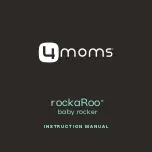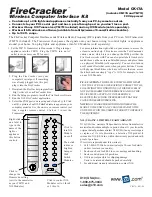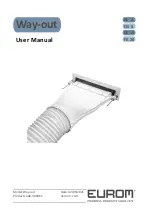
2
English
to facilitate the collection of spent nickel cadmium, nickel metal hydride
or lithium-ion batteries. Help protect our environment and conserve
natural resources by returning the spent nickel cadmium, nickel metal
hydride or lithium-ion batteries to an authorized D
e
WALT service
center or to your local retailer for recycling. You may also contact your
local recycling center for information on where to drop off the spent
battery. RBRC® is a registered trademark of Call 2 Recycle, Inc.
Register Online
Thank you for your purchase. Register your product now for:
•
WARRANTY SERVICE:
Registering your product will help you
obtain more efficient warranty service in case there is a problem
with your product.
•
CONFIRMATION OF OWNERSHIP:
In case of an insurance loss,
such as fire, flood or theft, your registration of ownership will serve
as your proof of purchase.
•
FOR YOUR SAFETY:
Registering your product will allow us to
contact you in the unlikely event a safety notification is required
under the Federal Consumer Safety Act.
Register online at www.dewalt.com/register.
Three Year Limited Warranty
D
e
WALT will repair, without charge, any defects due to faulty materials or
workmanship for three years from the date of purchase. This warranty does
not cover part failure due to normal wear or tool abuse. For further detail
of warranty coverage and warranty repair information, visit www.dewalt.
com or call 1-800-4-D
e
WALT (1-800-433-9258). This warranty does not
apply to accessories or damage caused where repairs have been made or
attempted by others. This warranty gives you specific legal rights and you
may have other rights which vary in certain states or provinces.
In addition to the warranty, D
e
WALT tools are covered by our:
1 YEAR FREE SERVICE (DCB404)
D
e
WALT will maintain the tool and replace worn parts caused by
normal use, for free, any time during the first year after purchase.
WARNING:
Fire hazard. Do not store or carry battery so
that metal objects can contact exposed battery terminals. For
example, do not place battery in aprons, pockets, tool boxes,
product kit boxes, drawers, etc., with loose nails, screws, keys,
etc. Transporting batteries can possibly cause fires if the
battery terminals inadvertently come in contact with
conductive materials such as keys, coins, hand tools and the
like. The US Department of Transportation Hazardous Material
Regulations (HMR) actually prohibit transporting batteries in
commerce or on airplanes (i.e., packed in suitcases and carry-on
luggage) UNLESS they are properly protected from short circuits.
So when transporting individual batteries, make sure that the
battery terminals are protected and well insulated from materials
that could contact them and cause a short circuit. NOTE: Batteries
should not be put in checked baggage.
Important Charging Note
Read manuals originally supplied with charger and tool before charging
and using this battery. The batteries should be recharged when they fail
or produce insufficient power on jobs which were easily done previously.
Recharge discharged batteries as soon as possible after use
or battery life may be greatly diminished. For longest battery
life, do not discharge batteries fully.
The RBRC™ Seal
The RBRC® (Rechargeable Battery Recycling Corp-
oration) Seal on the nickel cadmium, nickel metal hydride
or lithium-ionbatteries (or battery packs) indicates that
the costs to recycle these batteries (or battery packs)
at the end of their useful life have already been paid by D
e
WALT. In
some areas, it is illegal to place spent nickel cadmium, nickel metal
hydride or lithium-ion batteries in the trash or municipal solid waste
stream and the Call 2 Recycle® program provides an environmentally
conscious alternative.
Call 2 Recycle, Inc., in cooperation with D
e
WALT and other battery
users, has established the program in the United States and Canada
Summary of Contents for DCB404
Page 2: ......






























